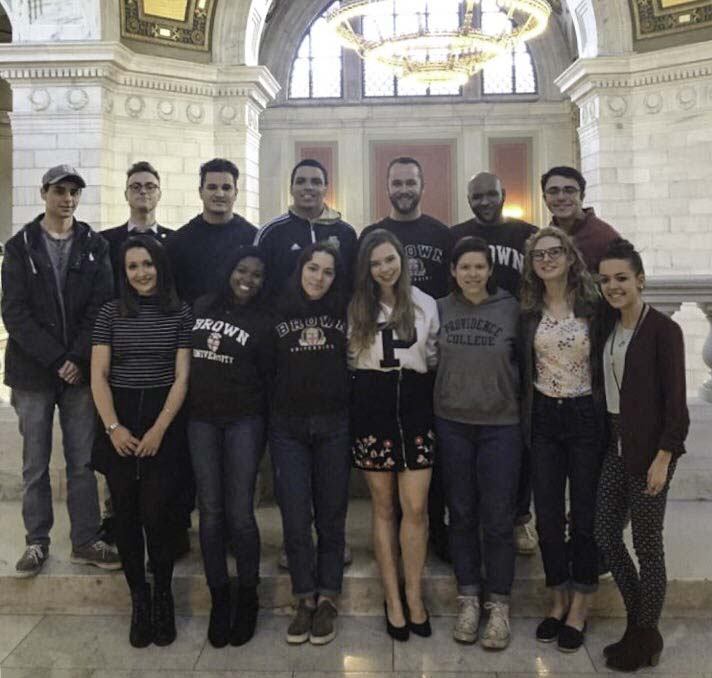Members of URI Democrats, accompanied by students from Providence College, Brown University and Bryant University, attended the Rhode Island Senate Finance Committee hearing. | Photo courtesy or URI Democrats.
On April 10, the University of Rhode Island Democrats club attended a Rhode Island Senate Finance Committee hearing to voice support towards the Rhode Island Promise scholarship.
The Rhode Island Promise scholarship is a last-dollar scholarship that waves tuition for two years at the Community College of Rhode Island (CCRI). Students who just graduated high school are eligible for the scholarship.
According to President of URI Democrats and senior Andy Boardman, CCRI saw a 43 percent increase in first-time, full-time student enrollment straight from high school in the first year of the program. The institution also saw a 54 percent increase in students receiving federal Pell grants and a 62 percent increase in first-time, full time students of color. Along with this, the program also saw almost a quadrupling of the numbers of students earning 30 college-level credits in their first year and CCRI is on track to nearly triple their two-year graduation rate.
Along with Boardman, Abby Appel, incoming URI Democrats Campus and Community Director, and Kevin Dyer, URI Democrats Secretary, attended the hearing, voicing their cases towards the support of Rhode Island’s Promise scholarship.
“It is a last scholar scholarship, so if you apply to CCRI, are admitted and enroll, then you take your scholarships that you get from other private institutions, you take the financial aid that CCRI gives you, and then the gap that remains between your scholarships, financial aid, and grants and the tuition, the state covers,” Boardman said.
This scholarship has been in place since 2017 and due to its effectiveness, Governor Raimondo has proposed to expand the program to cover two years of tuition free college at Rhode Island College (RIC) as well as expanding the program so that it’s not only available to recent high school graduates but also people who are 25 years or older.
“So if you are 30 years old, you never got your degree, you can go back to RIC and level up in your degree and pursue the occupation you want to,” Boardman said.
In 2017, when Raimondo first proposed the scholarship, URI Democrats went to the hearing in the State House and testified to the House Finance Committee. The public hearings gave students the opportunity to attend the hearings and speak on behalf of URI and students in Rhode Island who this scholarship impacts.
“It’s something we had done before and we had seen how much of an impact the student voices had had on helping that program be passed,” Boardman said. “There were a lot of students that were personally impacted by this and those student voices are very important and sort of underrepresented at times.”
When the scholarship came up for a hearing this year, URI Democrats decided they wanted to make their voices heard again.
“We wanted to let the legislature know how important this program is to them and how effective it is for young people and for our entire economy,” Boardman said.
After legislators talked about Raimondo’s budget, the President and faculty members of RIC testified for the passing of the scholarship. URI President Dr. David Dooley spoke on behalf of URI, presenting his concerns that by lowering the cost at RIC, students would be drawn to RIC who would otherwise go to URI. Dooley testified for the legislature to also include more funding for URI so that in the case that URI’s enrollment starts to decline, URI will not have to cut programs.
“I think that is a good way to solve that problem would be to also include URI in Rhode Island’s Promise and that is personally my end goal and what I think should be done,” Boardman said. “Hopefully we’ll get there are some point.”
Boardman and Appel stated that the level of support for the passing of the scholarship was overwhelming. While students that would benefit from the scholarship testified, students who were not directly impacted by public colleges in Rhode Island also testified in favor of the program.
“It was really good to see so many students who weren’t even directly affected by Rhode Island Promise there supporting it,” Appel said.
Although it was her first time testifying in front of legislatures, Appel said that she knew how important it was for college students to support it for the wellbeing of the community.
“I found everybody very receptive and it seems like this is something that the legislature and senate acknowledges is a very effective program and that it seems like they were happy to hear from students which was good,” Boardman said.





